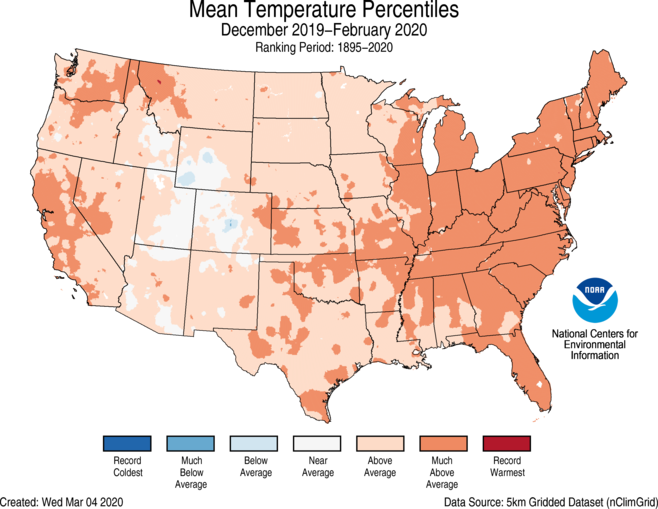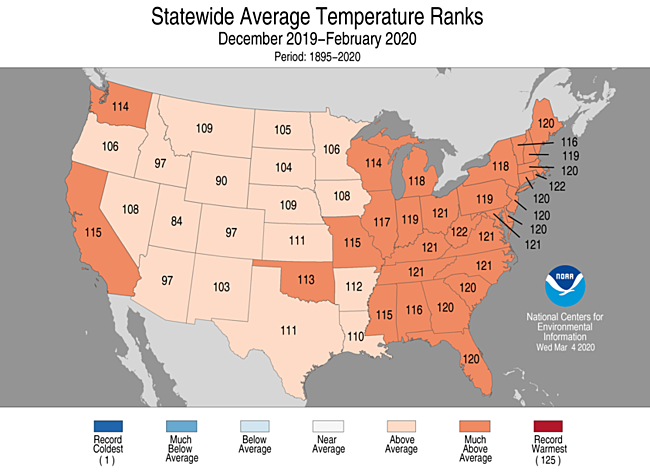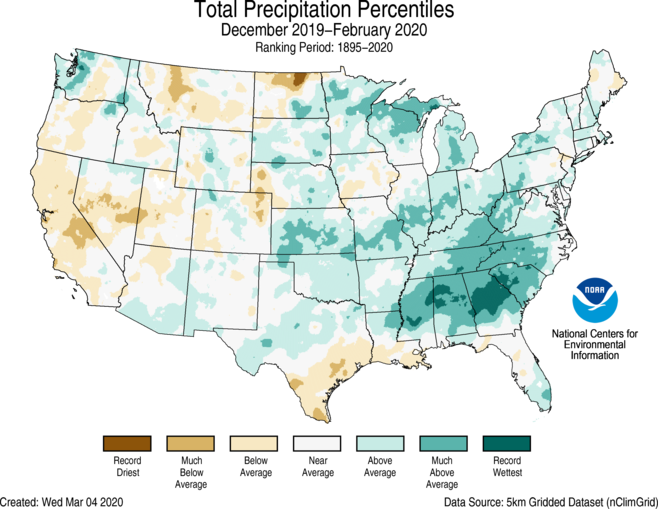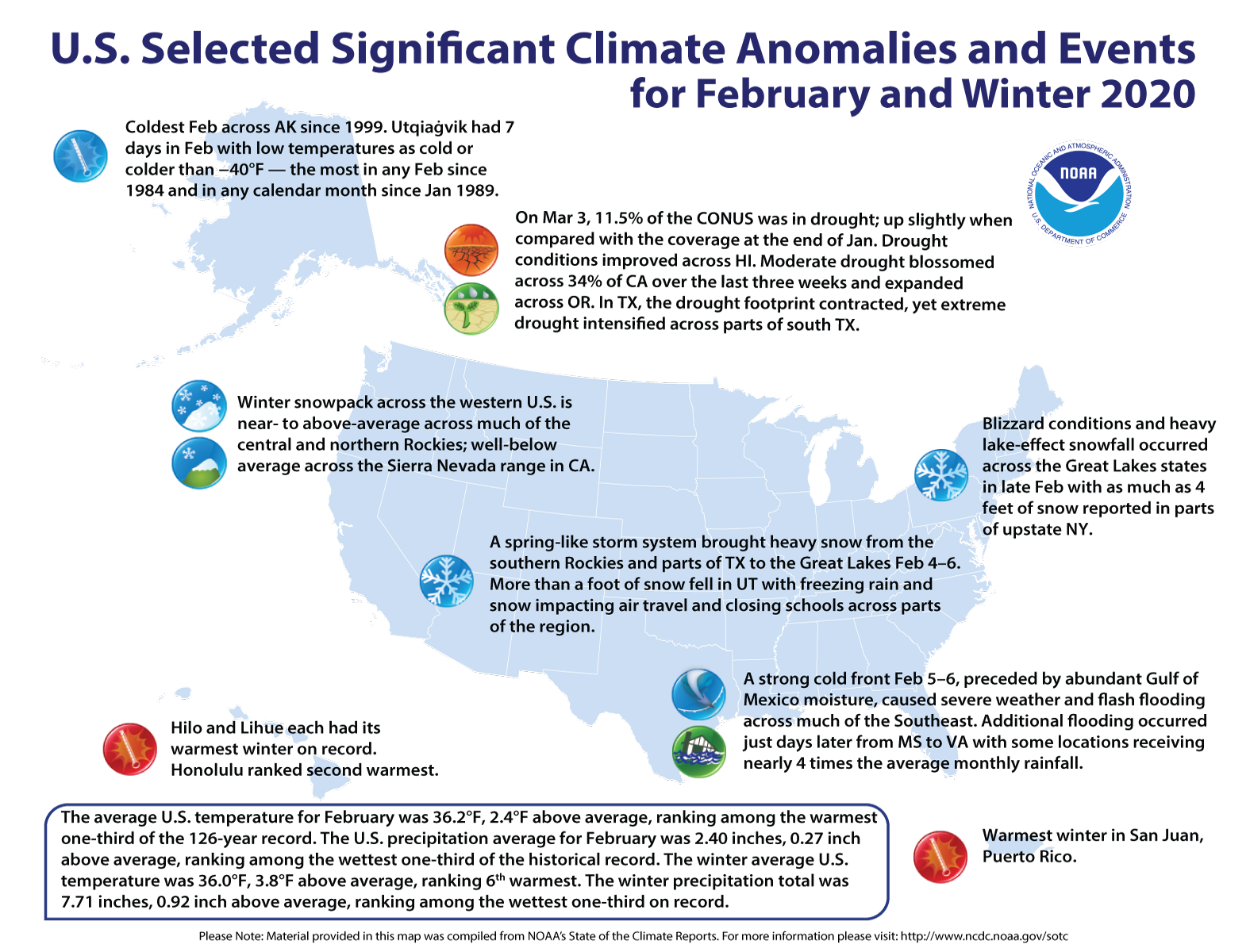Winter Months were the Sixth Warmest on Record
February continued the balmy trend, with unusually warm and wet conditions across the Lower 48 states last month. Not so for Alaska: The state shivered under its coldest February in more than 20 years.
Here are more highlights from NOAA’s latest U.S. climate report for December through February:
Climate by the numbers
Meteorological winter

It was a very warm and relatively wet meteorological winter (December through February) across the contiguous U.S. The average winter temperature was 36.0 degrees F (3.8 degrees above average), which made it the sixth warmest winter on record.
The Arctic Oscillation (AO) was strongly positive for most of the winter, particularly in January and February. Twice in February, it set all-time records for its highest values. The positive phase of the AO is associated with enhanced troughing of the upper-air jet stream in the Arctic and enhanced ridging of the jet stream in the midlatitudes. This strengthens the jet stream and traps the colder temperatures in the Arctic, leaving warmer conditions to the south, including across the contiguous U.S.
During January, February and the latter half of December, the Jet Stream was stronger than normal and upper-air troughs were strongest near Alaska, Greenland and central Russia, leading to persistently cold anomalies in those regions. The ridges were strongest over Europe, East Asia and the northeastern Pacific, allowing warmer anomalies to persist. As a result of this positive AO, winter temperatures were above average across most of the contiguous U.S. and much-above-average across the eastern U.S. West Virginia and Rhode Island each had their fourth warmest December–February on record. Twenty-two additional states had a top 10 warmest winter.

The Alaska December–February temperature was 0.7°F, 2.9°F below the long-term average, ranking among the coldest one-third of the 95-year record and the coldest winter in 21 years. Much-below-average temperatures were concentrated in parts of the Central Interior region with below-average temperatures across much of mainland Alaska. Above-average temperatures were present across portions of the Panhandle.
For the first time in 21 years, Fairbanks remained below freezing during all of climatological winter (December–February).
Total winter precipitation was 7.71 inches — 0.92 of an inch above average — ranking in the wettest third of the historical record. Winter was also part of a very wet stretch of months since last year, with a 12-month period (March 2019 through February 2020) precipitation total of 34.12 inches — 4.16 inches above average. It was the sixth wettest such period on record.
Much-above-average to record precipitation was observed from the Southeast into the Great Lakes. Alabama and Georgia ranked wettest on record for winter precipitation, while South Carolina ranked second wettest. Parts of the West and northern Rockies received below-average precipitation for the season.

Much of the Rockies, northern Plains, western Great Lakes and northern New England received average to above-average snowfall during winter. The Sierra Nevada Mountains, the southern Great Lakes and from the Ohio Valley to the Mid-Atlantic region and into the Northeast saw below-average to near-record low snowfall totals for the season. This was due in part to the northward deviation of the polar jet stream, which brought colder air to the West and warmer air across much of the eastern U.S. As a result, very few cold winter storms traversed the south-central portions of the Lower 48 and up the East Coast during the winter season.
Climatologically speaking, winter is the wet season in California and across much of the West. If March and April do not produce adequate precipitation to make up for the dry conditions experienced during winter, there will be increased concerns regarding sufficient water resources to get through the dry season (summer) and also for the increased potential for wildfires this coming fall.
While much of interior and northern Alaska was drier than average during the winter, portions of the Alaskan Panhandle were wetter than average. Petersburg, Alaska, received 40 inches of precipitation — the wettest winter since 2006–2007.
More notable climate event

-
Alaska on ice: It was the coldest February since 1984 in Utqiaġvik (Barrow), Alaska, and for the first time in 21 years, Fairbanks remained below freezing during all of meteorological winter.
-
The South got soaked: Alabama and Georgia had their wettest winter on record, while South Carolina saw its second wettest. In Jackson, Mississippi, wet weather pushed the Pearl River to its highest level since 1983, which caused significant and destructive flooding.
-
California eyes its water supply: After a very dry January, California had a record-dry February with only 0.20 of an inch of precipitation, beating the previous record of 0.31 inch in 1964. The arid winter increased concerns for sufficient water to get through the summer, as well as to fight wildfires that commonly occur in the fall.